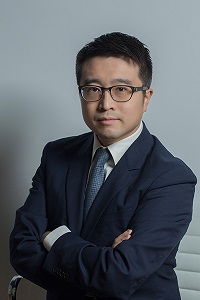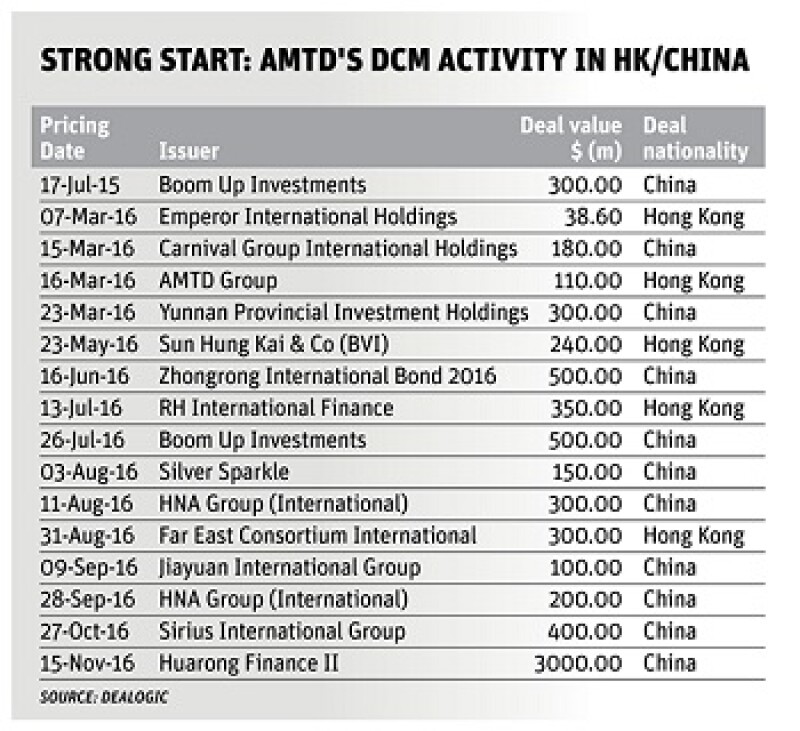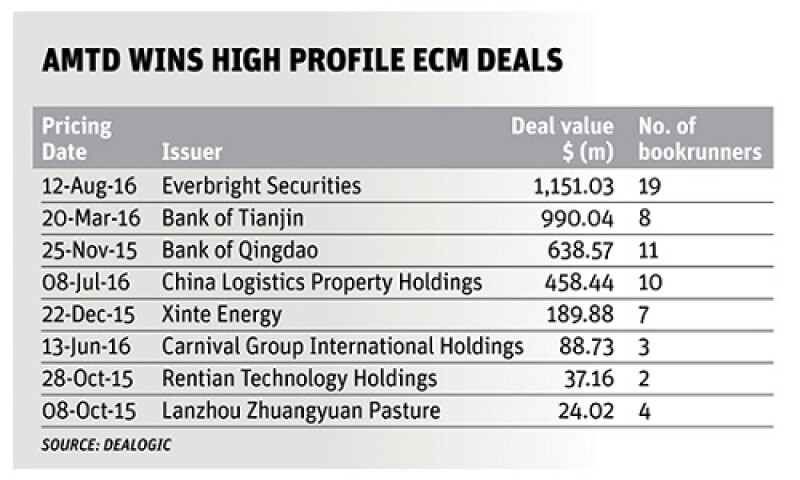AMTD is one of the Asia’s newer financial firms, having started operations back in 2003. The non-banking financial institution was founded by CK Hutchison Holdings — controlled by billionaire Li Ka-shing —and Commonwealth Bank of Australia.
Since then, its ownership structure has seen big changes with the introduction of Morgan Stanley Private Equity as a strategic investor in 2014. That was followed by China Minsheng Investment (CMI) and Canadian private equity firm LR Capital, both of which took majority stakes last year, with AMTD also launching its capital markets business in mid-2015.
Running the show is Choi, who was appointed AMTD’s chairman in February this year, before which he had stints at UBS and Citi after first cutting his teeth as an accountant.
“The most important thing for a financial institution is to have credibility — in terms of shareholder background and your network of resources,” Choi said at the end of September. “So when you have a Chinese sovereign-like player like CMI, the richest Chinese tycoon in the world, and a global financial institution like Morgan Stanley as shareholders, it’s the best you can have and provides comfort [to the market] that AMTD is solidly backed and supported.”

The firm’s backing has helped it build a roster of clients across both ECM and DCM. The first $100m-plus IPO featuring AMTD as one of the bookrunners hit the market in November 2015 when Chinese city commercial lender Bank of Qingdao raised $640m from an H-share float. Since then, AMTD has bagged leading roles on deals such as Xinte Energy’s $190m IPO in December 2015, Bank of Tianjin’s $990m Hong Kong IPO in March 2016, followed by China Logistics Property Holdings Co’s $433m listing and a $1.1bn transaction for Everbright Securities in August.
It has also boosted its DCM presence, running dollar deals for the likes of shareholder CMI as well as Jiayuan International, Regal Hotels, Sun Hung Kai & Co, Sirius International, as well as its own debut international bond. Dealogic has given it league table credit of $519.56m from 13 deals, putting it within the top 50 bookrunners in Asia ex-Japan as of November 15.
In ECM, AMTD ranks among the top 60 bookrunners in Asia ex-Japan ex-onshore China.
Choi says the rapid progress is thanks to AMTD’s approach to building long-term partnerships with its clients. “In all these relationships, if you keep on leveraging on the relationships to get an investment banking mandate, it is not enough,” said Choi. “Ultimately, you need to become their partners because they have so many needs that you can no longer give them just one investment banking service — you need to give them total solutions.”
“The effectiveness and eagerness to go and show others in the market, be it your clients or your business partners, that you can help them in the most effective way by knowing their needs, and where you don’t count every dime or dollar that you can get from them but instead count on the longer term win-win relationship, that helps our business,” he said.
Special place
Admittedly, the Asia ECM and DCM markets are more competitive now than ever. Many international banks, including the likes of Standard Chartered and Barclays, have exited the equities business altogether in the region. Meanwhile, houses like Goldman Sachs and Bank of America Merrill Lynch are slimming down their Asia investment banking operations.
Chinese banks and brokerages, on the other hand, have increased their market share, using their strong China links to win capital market mandates.
Against that backdrop, AMTD’s target is to bridge the gap between Chinese and international capital markets.
“Hong Kong has significant opportunities,” he reckoned. “There are Chinese players coming out to operate here, but they are not entirely connected with the international market. They have their own network of circles and work independently, so their eco system is not wide open and connected.
“But if you are someone that knows a lot about China, but you also know so much about the international markets, then you are not entirely China and you’re not entirely international. You become a special set-up in the middle to serve well as a bridge between China and international capital and opportunities and that’s our target.”
Market participants away from AMTD, however, are more sceptical. One Hong Kong-based headhunter said that while he does not directly track AMTD, he wonders whether the smaller boutique-style model can rival the services and credentials of conventional investment banks.
“Everyone is tightening their belts at the moment and getting mandates on deals that actually make you money is hard,” he said. “While there are advantages to being small in the sense that you can be more nimble, I’d take any new investment banking service with a pinch of salt — why would you start that business now when everyone is scaling back?”
A second headhunter pointed out to other boutique firms like Get Nice Securities, Sun Hung Kai Financial and Hong Kong-based Kingsway Financial Services Group, which he thinks have not managed to make much headway since being set up.
Kingsway, for example, ranked within the top 150 ECM bookrunners in the region as of November 15, down from being within the top 90 during the same period last year. Kingsway was set up in 1990 and its corporate website says it specialises in IPOs, M&A and rights issues among other advisory services. Get Nice, meanwhile, had ECM league table credits for $163.5m via 10 deals as of November 15.
There are opportunities, however. Hong Kong’s market has been overwhelmed by listings from Mainland companies, but Choi thinks that is because the “bigger banks with international networks and client bases are not working hard enough to bring international deal flows into Hong Kong”.
“We rarely see deals now that are solely taken up by a bulge bracket firm,” he said. “Banks have deal flow, but in this market it’s difficult to sell to investors. And if you are trying to sell to Chinese investors and the most buying power in the markets are Chinese, the Chinese banks — most of the time — can do it better. So ultimately, there is lack of momentum and appetite to bring unique deals into the local market.”
Big hires
With a team of 23 within the capital markets and advisory unit, AMTD is now hoping to identify more of these “unique deals”. Financial technology is one area of focus with AMTD partnering with LendIt to host the global fintech investment summit in Hong Kong in July this year.
The event welcomed more than 80 Asian investors as well as about 40 international companies such as US P2P platform Prosper, personal lending and wealth management firm SoFi and start-up financing platform FundersClub.
In addition, AMTD has provided financial advisory services to a series B+ round of fundraising for online chauffeured car service provider UCar Technology and online second-hand cars platform Youche.com.
The southeast Asian market is also one that AMTD is keen to break into, but given the dominance of local players in the region, they are watching the market carefully.
Nevertheless, in a bid to ramp up its operations, AMTD, which is short for At Minus Times Divide, has been on a hiring spree. The firm hired William Fung, formerly an executive director on UBS’s DCM syndicate team for Asia, in the middle of 2016 and added Michelle Li as a research analyst. Li was also previously at UBS and worked across fixed income and equity research for Asian financials as well as equity research for China banks, according to her LinkedIn profile.

A big coup this year was hiring Bob Leung as vice-president, who until recently was heading up Asia Pacific non-bank financial institutions for UBS. The Swiss bank first nabbed Leung from Deutsche Bank in 2011 to head its insurance research unit for the region. Leung was then relatively well-known, having been voted as the top analyst for insurance coverage in Asiamoney’s 2010 Brokers Poll.
AMTD is looking to boost its head count in the capital markets and advisory business to as much as 30 bankers by next year, and over a three-year horizon to more than 60. In the future, it also wants to roll out a system of allowing employees to become stakeholders through either an employee stock option programme (ESOP) or other share incentive schemes.
Having an entrepreneurship approach to AMTD, where employees can be shareholders and rise up the rank to partner, is the ultimate aim. And this strategy could benefit in the long run as compliance becomes tougher, argued Choi.
“When I built this company, I gave lots of importance to compliance and code of conduct,” he said. “The shareholder base and credibility of the company are important. In every town hall meeting when I talk to the employees I emphasise that even if you work hard, you may not deliver the outcome because the market isn’t there or you just couldn’t deliver at the end of the day. And that’s OK. But I can’t tolerate if you violate rules or don’t comply with regulations — that I have zero tolerance for.”
It is this emphasis that drove the appointment of two vice-chairmen. Marcellus Wong, vice-chairman of the board of directors, is also a senior adviser on the advisory committee of LR Capital and in the past worked as a partner at PricewaterhouseCoopers where he was the head of risk and quality for the tax practice in Asia Pacific until his retirement in July 2012.
The vice-chairman of the global advisory committee is Raymond Yung, who has previously also worked at PwC and served as an adviser to the Hong Kong Monetary Authority.
But a third Hong Kong-based headhunter said that while AMTD’s standards are very high, he is concerned about the fact that some of its staff work across the buy and sell side, making it an unsustainable model.
Choi, however, says the Chinese walls to separate the buy and sell side and other conflicted functions are well structured within AMTD. On the investment front, every decision goes via a committee in the CIO office. AMTD looks at all deals that fit with its positioning, but doesn’t hesitate to pass up opportunities that do not make sense or with parameters that do not match the investment committee’s criteria — no matter how rich the investment returns could be.
Global footing
With business in Hong Kong gaining traction, AMTD is now keen to go global. By the end of 2016 or early next year, the bank is planning to set up offices in New York and London, with services spanning investment banking, asset management and insurance brokerage — similar to the structure in Hong Kong.
“I’ll have my team locally engaged in major cities globally. And this is important because when I do all these global deals, despite [their global nature], most of the sales and distribution takes place in Asia. But ultimately we want to play the institutional angle not just for selling and distributing deals. It’s for connecting different markets in terms of intelligent relationships and local resources because you do need a global connectivity to bring everything together.”
Once the international units have been set up, it will help Chinese issuers list in those jurisdictions, while also assisting international companies to raise capital from Asia, says Choi.
Of course, the investment banking model has changed dramatically recently, making it harder to woo potential issuers. Choi remembers churning out deals in the past “like a machine” where executing a transaction was a step-by-step process, from origination to execution, then talking to the ECM desk, and on to syndicate and equity sales team to the end investor.
Now, it is no longer about the process by which banks sell deals but rather the strategy they deploy.
“You need to recognise that every deal [in Hong Kong] is pretty much like a private placement nowadays, so you need to understand the issuer well. No matter how well you write the prospectus, it’s not like in the [old] days because institutional appetite has changed and investors won't just buy solely on how well you craft the investment story.
“It’s about finding the uniqueness within the investor circle — what are the pockets that will be interested in this type of industry and the synergies you can create for both sides.”
PB arm, insurance IPO up next
Away from capital markets, AMTD also houses asset management and insurance brokerage arms. The former is expected to surpass $2bn in assets under management by the end of the year, while AMTD is focusing on corporate clients at the latter.
Given the Hong Kong insurance market is very fragmented, it provides plenty of opportunities for acquisitions, says Choi. International players in the sector typically service just international or multinational companies, while some of the more local service providers focus on Asian blue-chips.
To give a fillip to its business, AMTD is looking to list the insurance brokerage arm in Hong Kong by the first quarter of 2017.
And there is more on the cards, with the firm looking to expand its services to include private banking next year.
“When you are too big, you can lose your focus. But when you are small and gradually building up the pie, you can cherry pick only the best [sectors]. The market is frustrating and there’s a bit of a downturn. But it is one with lots of opportunities to pick up and add on to your business. To gradually build into a special, unique and boutique type of set up with comprehensive financial services and solutions is very interesting.
“So the core areas of business that will form my eco system will be investment banking, insurance brokerage, asset management and private banking. Next year will be an important year for us,” added Choi.


